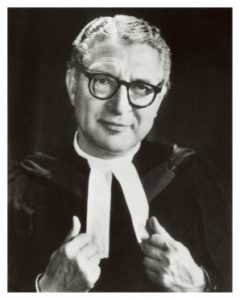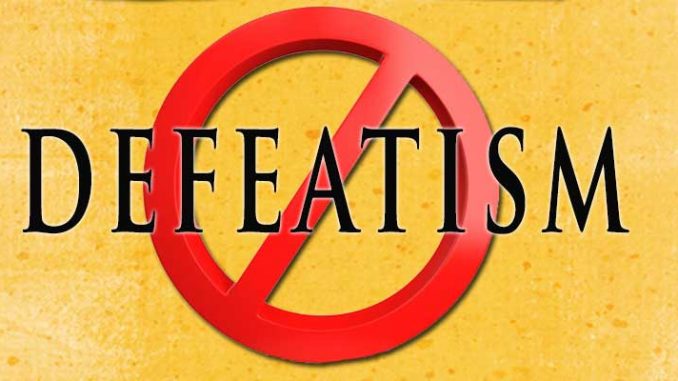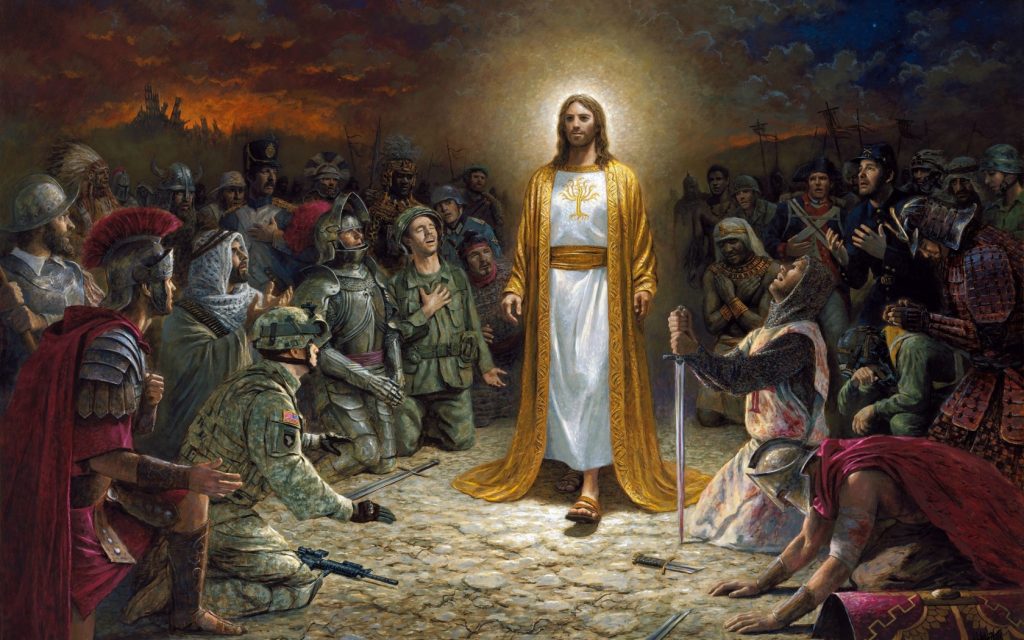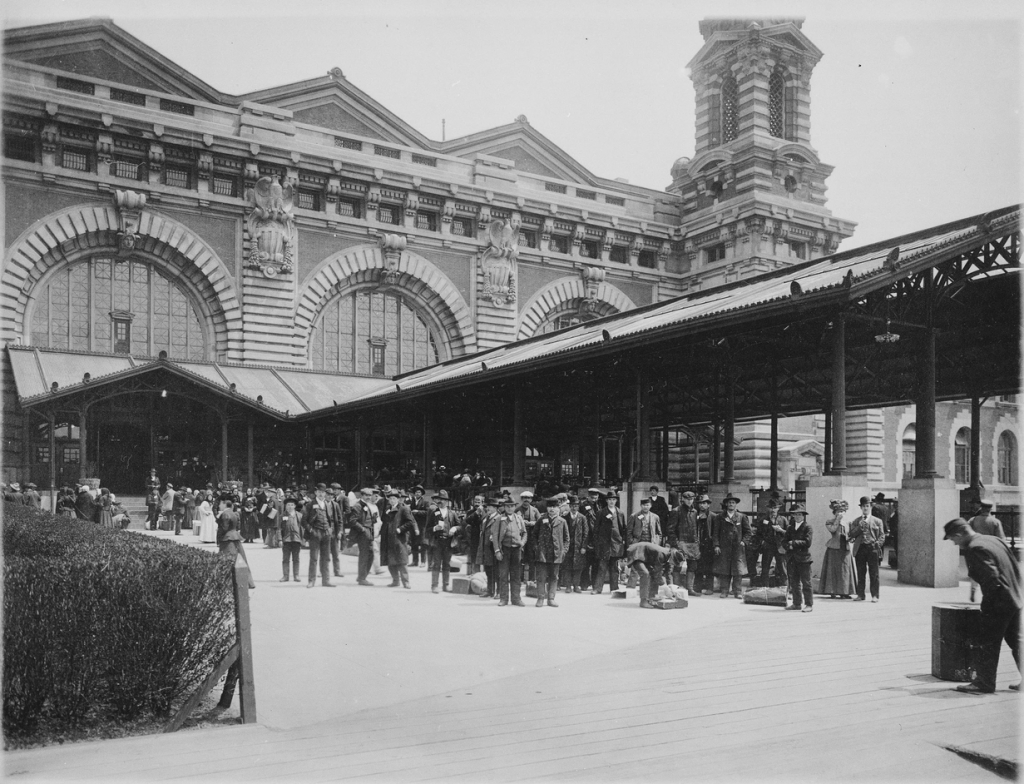Editor’s Note: This sermon was preached by W.E. Sangster, a Methodist minister in the early 20th Century.
“Beloved, now are we the Sons of God, and it doth not yet appear what we shall be: but we know that, when he shall appear, we shall be like him, for we shall see him as he is.”
— I John 3:2
 “Defeatism” is not a pleasing word, but it is a popular one. Its wide use indicates its serviceableness to those who want to describe the strange temper of the times, a compound of doubt, depression, and hopelessness. All spheres of life are infected. Statesmen feel it. They want peace, but they are so sure that they cannot get it that they bend their whole strength to the preparations for war. Economists feel it. They dread a slump in trade, but they have no confidence in their ability to avoid it. Doctors feel it. Lord Horder said recently: “All is not well with the family doctor…He has lost caste…He must change his own attitude of defeatism.” The Church knows the malady too. I talked with a layman recently who has given all the leisure of the last twenty years to sustain a waning cause in the inner belt of a large city, and looking back over the years he felt that the strain had achieved nothing. “We’ve kept the doors open,” he said. “It has been an awful struggle, and it has left us neither time nor strength for really spiritual things. I asked myself the other day what we had achieved, and I could only conclude that we had done nothing but keep the minister and the caretaker!” Some ministers are in the same slough of despond. Sharing their problems with me recently, some young men raised the question as to whether the Church, as an institution, was under sentence of death and if, with their life before them, they ought to remain in the ministry. They appeared to think that any efforts to resuscitate it was “painting the ship while she goes down.”
“Defeatism” is not a pleasing word, but it is a popular one. Its wide use indicates its serviceableness to those who want to describe the strange temper of the times, a compound of doubt, depression, and hopelessness. All spheres of life are infected. Statesmen feel it. They want peace, but they are so sure that they cannot get it that they bend their whole strength to the preparations for war. Economists feel it. They dread a slump in trade, but they have no confidence in their ability to avoid it. Doctors feel it. Lord Horder said recently: “All is not well with the family doctor…He has lost caste…He must change his own attitude of defeatism.” The Church knows the malady too. I talked with a layman recently who has given all the leisure of the last twenty years to sustain a waning cause in the inner belt of a large city, and looking back over the years he felt that the strain had achieved nothing. “We’ve kept the doors open,” he said. “It has been an awful struggle, and it has left us neither time nor strength for really spiritual things. I asked myself the other day what we had achieved, and I could only conclude that we had done nothing but keep the minister and the caretaker!” Some ministers are in the same slough of despond. Sharing their problems with me recently, some young men raised the question as to whether the Church, as an institution, was under sentence of death and if, with their life before them, they ought to remain in the ministry. They appeared to think that any efforts to resuscitate it was “painting the ship while she goes down.”
But how remote all this sounds from the spirit of the New Testament and how strange among the people who recovered, for all Christendom, the Pauline doctrine of assurance! Concerning this doctrine Doctor Denney said, “Speaking broadly, we may say that in Romish churches it is regarded as essentially akin to presumption; in the Protestant churches it is a privilege or a duty; but in the New Testament it is simply a fact.”
It was simply a fact in early Methodism. Wesley guarded it, expounded it, battled for it, and rejoiced in it and “the people called Methodists” rejoiced with him. They lived in days of vast uncertainty, of civil strife, of colonial disruption, and the threat of foreign invasion, but nothing could dislodge their certainty. It was not based on their feelings, though it mightily affected them. It was based on the facts of revelation, and their experience of God in Christ.
Nothing would so defeat the defeatism of the present times as the recovery of Christian assurance. God is longing to meet repentance and surrender with absolution and the seal of sonship, and to guard His children’s peace in a distraught world. Dr. H. B. Workman says: “Once let Methodism as a Church lose this note, and its historic justification has perished.” 1 We believe it. But who would say that Methodism has the note of assurance today?
Or look at it from another angle. Listen closely to the men who still feel that they have a word for us in these perplexing times, and how many of them fail to display any confident assurance themselves! They try to whip up a quick keenness for some new “adventure,” or “challenge” us to embark on some new “quest.” Perhaps it is a proof that we are no longer adolescent, that we have grown weary of these constant incitements, and are seeking for certainty rather than a new thrill.
Not that we have no use for the word “adventure” at all; but it is only some kind of adventure that we want. We ache to get right past the need to go in quest of God, and we want to exhaust all our passion for adventure in a quest with God. The difference is immeasurable. The word “adventure” belongs only to this second kind of quest. The other thing is not an adventure; it is a nightmare. A true adventure requires confidence at the heart’s core, and a degree of detachment from cares that come too closely in. In a true adventure the element of fear is only a condiment at the feast; it must not maintain itself in the central place. That is why these parsons and social workers who spend a week or a fortnight on the
road, and try to share the plight of the unemployed by sleeping in a casual ward or a “flophouse,” may justly describe their experiences as an “adventure.” When they go farther and claim that they have identified themselves with these men, and really understand their position, they are talking utter nonsense. These adventurers know quite well that if the worst comes to the worst, however little money they have in their pocket, they can go to the post office, or the police station, and wire for a few dollars. It is beside the point to say that they do not do it. They could do it, and the real tramp cannot and that makes all the difference. One is an adventurer; the other is a vagabond. One can enjoy the delight of doing the daring thing; the other walks numbly on, wondering where he will find something to eat. One can set an end to his exile; the other sees it stretching on forever.
That puts the points fairly well so far as this spiritual quest is concerned. We do not want to be religious vaga- bonds all our days, living on the scraps that we pick up as we go along, but with a great big fear in the forefront of our mind. We want that core of confidence, and central certainty, which the true adventurer enjoys. We are prepared to say with, the hymn writer, “We go in quest,” if we may say as swiftly as he does, “Still Thou art our abode,” because, then, we shall feel that it is not just one quest after another, but that, when the fires of life burn low or sorrow overwhelms us, we need not go in quest at all; we may stay at home for a while a home rich with every comfort, and utterly satisfying in the
certitude of the Father’s presence.
Yes, that is what we want what we wanted, we ought now to say. Looking back, it is perfectly clear that it had some merit to be honest with our own hearts, and to make our needs vocal to ourselves. It made us face such acid questions as these: Does God intend that we be wistful all our days? Does He love us, and forgive us, and yet want to keep us ignorant that we are His? Can we live without this sense of certainty, and convince ourselves that it does not matter? We came to a definite answer on all these questions. It might have been more devout to have avoided answering them, and temporized with our clamorous hearts by concluding that God would give, or withhold, according to His good pleasure. Instead of that we said: “God does not intend us to be wistful all our days. He wants us to be sure of His forgiveness and His love. If we are to live without this sense of certainty, we shall be as birds with a broken wing.”
And that was where the old Methodist hymns came in. To this plain conviction that God wishes us to be sure, they added the impressive witness of men and women who were. What joy it was and is to read those hymns over and over again. Even in the days when one had so little experience out of which to sing them, and sang them, therefore, with a sense of unreality, one always knew that the unreality was in oneself, and not in the hymn. God wills this thing. Godly men and women have enjoyed it. These were milestones on the pilgrimage, and definite steps toward certainty.
Everybody has had the experience of hearing a voice call them from some absorbing task, and realizing, at their first response to it, that it had been sounding on the fringe of consciousness for some time before. One starts up with a guilty feeling, and finds the voice astonishingly loud the moment it becomes the focus of attention. I think it must have been like that when, at the first, the Spirit bore witness with our spirits that we were the children of God. Won to a fuller surrender, keeping the morning watch with the strictness of good soldiers, and prosecuting the search for certainty with the zeal of those who feel it is at hand, we became aware of an impression on the mind, a “comfortable voice,” and inward assurance (these are poor phrases, but the truth breaks through language and escapes), yet as “absolute and luminously self-evident,” as Newman says the Creator was to his child mind. And as we regarded it, it grew clearer, and brought with it a sense of the most satisfying peace not a peace to which we were foreign before, but richer in quality, reaching to the very heart of our need, and making us feel that the search for certainty was at an end. Even in that hour of relief and plenitude the individualism of it was present to our mind. Confirmation will be required for this, we thought. Reasons must be given but only to other people. In the possession of this inward witness, the pursuit of reasons for oneself would be mere academics. Small wonder that those early Methodist hymns are full of such abounding confidence, and make such frequent use of the word “know.”
Clearly, this experience lies behind Wesley’s Sermon X. For this he battled with the Bishop of Lichfield and Mr. John Smith. And we are now in that succession of Methodists more than name. “The witness in ourselves we have.” Thank God, we are not without evidence that He is going to justify the rest of that quotation too. He is loosening the pride in us, removing those petty jealousies, and giving us grace to endure misrepresentation without bitterness. May He hasten the day when others can say of us what we shrink to say of ourselves, “And all its fruits they show.”
It was when we came to tell others of this experience that we met with difficulty. Some were pained that we had not enjoyed it from our youth up, and others were pained that we had the temerity to claim it at all. It was bewildering to be found wrong in both quarters, but for precisely opposite reasons. To our first critics, we simply pleaded guilty. It was astonishing, but true. Yet, surely, some excuse could be found. John Wesley, a better man than any of us, was thirty-five before the experience came to him. And, after all, had we not been born into an age when the very structure of society rocked with the greatest war in history, and the Church was making heavy weather after sixty years of Biblical criticism? We grew up in a generation in which the pulpit lacked the note of confidence. No wonder we were left in ignorance of our birthright, and suspected ourselves when the experience came. But it has come! For some time now we have been able to sing without a sense of unreality, “What we have felt and seen, with confidence we tell.”
It is with the other critics that we find it hardest to come to terms those who marvel at our presumption in claiming the experience at all. We have been reminded that “so great a man” as Newman denied the possibility of this inner witness. We have been told that this claim flouts the common sense of ordinary men, who feel upon this subject just what Quiller-Couch suggests that Hetty Wesley felt:
“Of a way to forgiveness through faith (though she must have heard of it a hundred times) she scarcely thought; still less of a way through faith to instant assurance. To those who have not traveled by that road its end though promised on the honor of God and proclaimed incessantly by those who have traveled and found it seems merely incredible. Hardly can man or woman, taught from infancy to suspect false guides, trust these reports of a country where to believe and to have are one.”
Even in Methodist circles we have been warned against the dangerous presumption of it, and told that it greases the path to spiritual pride. There is a strident note in those who claim it, we are told a hard, unyielding dogmatism; an assertiveness and overconfidence that are not truly Christian. Let us admit at once that, if this were true, it would be very sad, for they are all grievous faults. Nor am I concerned to defend the extravagances of immature converts, and from the abyss of spiritual pride I shrink with loathing.
But let us set all these aberrations aside for the moment, and seek a simple answer on the main question. Is there such an inner witness? And, if there is, may we not proclaim our possession of it in no uncertain way? Is the appearance of pride so great that we must follow the example of Dr. Samuel Annesley, and carry it about like a guilty secret for forty years, but never preach it to a soul? Or, should we be so sobered by the extravagances of charlatans and novices that we hold our tongue? Must we be silent because a braggart shouts? Or is the confirmation of the Church so much more than mere confirmation that we must deny the voice in our own soul until “some man in robes” approves it? And, even if we seek to conceal it, what hope is there that we shall succeed? Like Johnson’s philosophical friend, we shall find it rising again for all our efforts at repression, and, somehow, we cannot shake off the feeling that people are eager for that definite note. It would be as much a pose now to speak uncertainly, as it was once a pose to say that we knew.
One friend, who is wise in the things of God, has expressed the opinion that it is better to be uncertain of God and humble, than certain of Him and proud. Quite so! But are we shut up to that alternative? May we not be certain and humble too? When Charles Wesley found his soul “unutterably full of glory and of God,” did pride have a corner in it as well? I cannot think so. Great confidence in God and a sense of certitude, can be compounded with deep humility. He calls a worm His friend. There it is! A worm: a friend of God. Both. The wonder of it!
So we preach Assurance, like the early Methodists, as “the common privilege of Christians.” We know its real source. It is neither a “presumption of the natural mind, nor a delusion of the devil.” The Spirit Himself beareth witness with our spirit, that we are the children of God.









